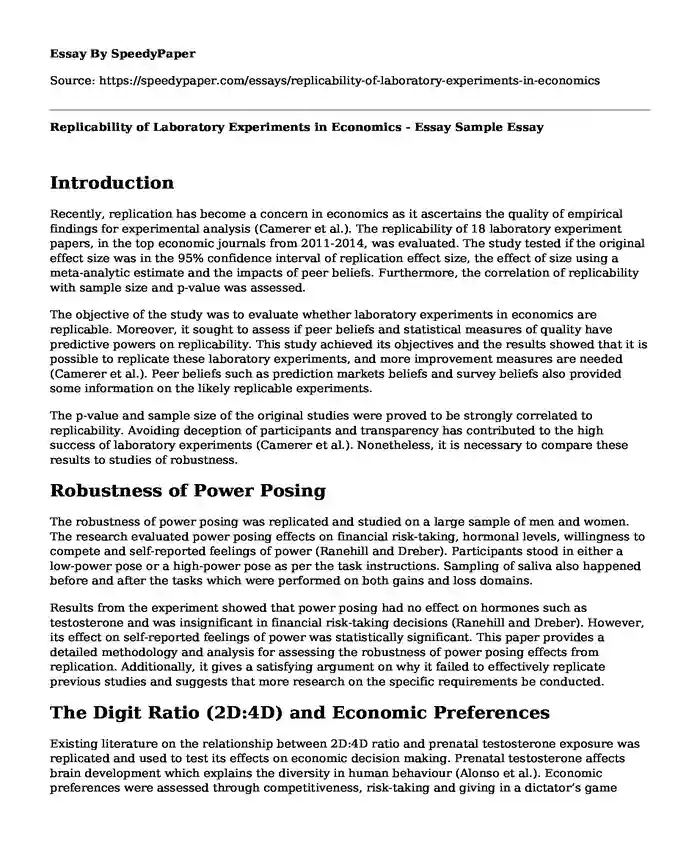
| Type of paper: | Essay |
| Categories: | Economics Government |
| Pages: | 3 |
| Wordcount: | 649 words |
Introduction
Recently, replication has become a concern in economics as it ascertains the quality of empirical findings for experimental analysis (Camerer et al.). The replicability of 18 laboratory experiment papers, in the top economic journals from 2011-2014, was evaluated. The study tested if the original effect size was in the 95% confidence interval of replication effect size, the effect of size using a meta-analytic estimate and the impacts of peer beliefs. Furthermore, the correlation of replicability with sample size and p-value was assessed.
The objective of the study was to evaluate whether laboratory experiments in economics are replicable. Moreover, it sought to assess if peer beliefs and statistical measures of quality have predictive powers on replicability. This study achieved its objectives and the results showed that it is possible to replicate these laboratory experiments, and more improvement measures are needed (Camerer et al.). Peer beliefs such as prediction markets beliefs and survey beliefs also provided some information on the likely replicable experiments.
The p-value and sample size of the original studies were proved to be strongly correlated to replicability. Avoiding deception of participants and transparency has contributed to the high success of laboratory experiments (Camerer et al.). Nonetheless, it is necessary to compare these results to studies of robustness.
Robustness of Power Posing
The robustness of power posing was replicated and studied on a large sample of men and women. The research evaluated power posing effects on financial risk-taking, hormonal levels, willingness to compete and self-reported feelings of power (Ranehill and Dreber). Participants stood in either a low-power pose or a high-power pose as per the task instructions. Sampling of saliva also happened before and after the tasks which were performed on both gains and loss domains.
Results from the experiment showed that power posing had no effect on hormones such as testosterone and was insignificant in financial risk-taking decisions (Ranehill and Dreber). However, its effect on self-reported feelings of power was statistically significant. This paper provides a detailed methodology and analysis for assessing the robustness of power posing effects from replication. Additionally, it gives a satisfying argument on why it failed to effectively replicate previous studies and suggests that more research on the specific requirements be conducted.
The Digit Ratio (2D:4D) and Economic Preferences
Existing literature on the relationship between 2D:4D ratio and prenatal testosterone exposure was replicated and used to test its effects on economic decision making. Prenatal testosterone affects brain development which explains the diversity in human behaviour (Alonso et al.). Economic preferences were assessed through competitiveness, risk-taking and giving in a dictator’s game using a large sample of women of different ages and sexual orientation.
Throughout the economic experiment, the order of the tasks remained similar for all the participants, and they were unaware of the financial incentives they would receive. Generally, the results indicated no significant effect of prenatal testosterone levels on the economic preferences studied (Alonso et al.). However, this paper succeeded in showing how changes in particular aspects of the original studies affected its replication. Factors such as using females only or weak relationship between prenatal testosterone exposure or the likelihood of false positives could have contributed to its results.
Works Cited
Camerer, Colin F., et al. “Evaluating Replicability of Laboratory Experiments in Economics.” Science, American Association for the Advancement of Science, 25 Mar. 2016, science.sciencemag.org/content/351/6280/1433.
Eva Ranehill, Anna Dreber. “Assessing the Robustness of Power Posing: No Effect on Hormones and Risk Tolerance in a Large Sample of Men and Women - Eva Ranehill, Anna Dreber, Magnus Johannesson, Susanne Leiberg, Sunhae Sul, Roberto A. Weber, 2015.” SAGE Journals, journals.sagepub.com/doi/abs/10.1177/0956797614553946?journalCode=pssa.
J. Alonso, R. Paolo, et al. “The Digit Ratio (2D:4D) and Economic Preferences: No Robust Associations in a Sample of 330 Women.” Journal of the Economic Science Association, Springer US, 1 Jan. 1970, link.springer.com/article/10.1007/s40881-019-00076-y.
Cite this page
Replicability of Laboratory Experiments in Economics - Essay Sample. (2023, Dec 29). Retrieved from https://speedypaper.net/essays/replicability-of-laboratory-experiments-in-economics
Request Removal
If you are the original author of this essay and no longer wish to have it published on the SpeedyPaper website, please click below to request its removal:
- Declaration of Independence Essay Sample for Free
- Essay Example on Development Federalism
- Paper Example - State vs. Federal Taxes on Businesses
- Essay Sample on Population-Based Care During COVID-19: Challenges and Administrative Healthcare Collaboration
- Rapid Deployment of Troops: Key to Resolve Crises? - Essay Sample
- Free Essay on Georjan and Building Cleaner
- Free Paper Sample on Business Organization
Popular categories




